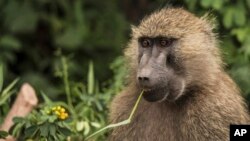New research on baboons, published in the journal Science, says primates are a very democratic bunch.
“In a baboon troop, you've got this huge variety of types of individuals, who probably all don't want to do the same thing at the same time but have to come to a single decision about where to go and what to do,” said Margaret Crofoot, a primatologist at the University of California. “To me, that is a really interesting question: how do they negotiate those decisions?”
Crofoot watched for signs of negotiation in a baboon troop as they moved through the Kenyan wilderness.
WATCH: Animation showing a troop of baboons on the move. Data shown at 25x speed over a 25-minute period, as the baboons departed from their sleep site. Points indicate individual baboons, with colors denoting age/sex class (dark blue = adult male, light blue = subadult male, red = adult female, orange = subadult female, grey = juvenile male).
Crofoot and her team fitted 25 of the baboons with a GPS collar, which recorded the animal's location second-by-second for two weeks. They received about 20 million data points.
To transform these snapshots into meaningful movements, they measured the distance between two baboons. How that changed revealed how the group moved as a whole.
Crofoot said they were surprised the troop did not follow the dominant male. Instead, the majority ruled. Baboons followed the baboon or group of baboons that had the most followers.
“What our results illustrate is that, it may be true that under some circumstances, dominant individuals can dictate what the group does,” she said. “However, it's a much more democratic, egalitarian process. All of the individuals in the group are having a voice in what happens.”
Instead of following direct orders, a baboon figures out where to go by looking around and taking mental note of where others are going.
Reacting to neighbors during group movement is nothing new among fish and birds, but the researchers were surprised to see it in creatures like baboons that have to fend off predators and find food as they move through their environment.
When baboons could not compromise on where to go, Crofoot said they had to stop and think about it. This wasted precious time that they could have spent on grooming, socializing, eating, and playing, she said.

